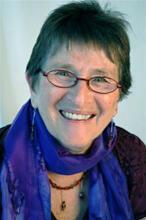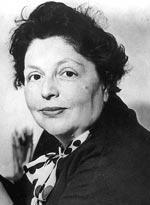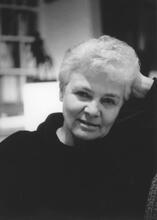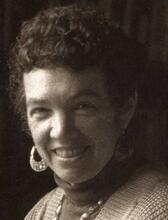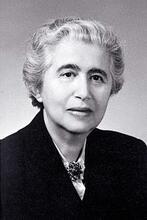Leni Yahil
Leni Yahil was an Israeli scholar and pioneer of Holocaust research in the decades following the Second World War. Born in Germany, she immigrated to Palestine in 1934 with members of the Jewish youth movement Werkleute and went on to study History at Hebrew University. While later briefly living abroad in Scandinavia with her family, Yahil was asked by Yad Vashem to gather information on the experience of Northern European Jews during the Holocaust. Yahil went on to pioneer this particular field of inquiry, writing her dissertation on the experience of Jews in Denmark during the Holocaust; from 1966 onward, she was involved in academic activity. Her work uniquely emphasized the importance of Jewish primary sources and Jewish perspectives on the Holocaust, highlighting the role of Jewish resistance to Nazism and challenging assumptions about Jewish passivity.
Leni Westphal was born in 1912 in Düsseldorf, Germany and raised in Potsdam. She was a sixth-generation descendant of the family of Moses Mendelssohn and a granddaughter of James Simon, with whom she was particularly close. The first Hebrew book that she received from her grandfather was a Bible with German translation containing a personal inscription from him. Her father, Ernst Westphal, was a judge.
Young Adulthood in Palestine
After completing her studies in Potsdam, Yahil embarked on the study of history at the universities of Munich and Berlin and was accepted into the Hochschule für die Wissenschaft des Judentums (College of Judaic Studies) in Berlin. Her studies were cut short when the Nazis ascended to power. She devoted herself to the Jewish youth movement Werkleute (Workmen), becoming one of its leaders. Yahil immigrated to Palestine in 1934 with other members of the movement, who lived as a group in Haderah before their future settlement was established; among other things, she worked in the surrounding area, packing oranges for transport. During the winter of 1935/36, she left the group before its official inauguration as a settlement (at the site of present-day Kibbutz Ha-Zore’a) and moved to Jerusalem to study at the Hebrew University. She majored in general history, with a dual minor in Jewish history and Hebrew literature. In 1940 she completed her master’s degree, writing her thesis on “The Concept of Democracy in Tocqueville.”
Following her studies, she engaged in various cultural, political and journalistic activities (1940–1947, 1949–1953) in the labor movement and the women’s section of the Histadrut (Israeli labor federation), and in various positions at Davar (the Histadrut’s daily newspaper). In 1941, while working on preparations for a program of seminars as Berl Katznelson’s secretary, she met Chaim Hoffman (later Yahil; 1905–1974), who was one of the lecturers. They married in 1942 and had two sons: Amos, born in 1943 (now a professor of astronomy) and Jonathan, born in 1945 (fell in Jerusalem in the Six-Day War in 1967).
Sojourns in Europe
The family would often accompany Chaim Yahil on his postings abroad. In 1947 they joined him in Munich, where he served from December 1945 to April 1947 as head of the Jewish Agency welfare units under the auspices of UNRRA in the DP camps in occupied Germany. Leni Yahil edited the English-language monthly, News from Israel. From 1953 to 1954 the family resided in Cologne, where Chaim Yahil represented the Foreign Ministry as deputy leader of the Israeli delegation handling the implementation of the reparations agreement between Germany and Israel. From 1956 to 1959 he held the post of Israeli ambassador to Sweden, Norway and Iceland (from the age of thirteen, the children studied at Wittingham College in England). Between 1961 and 1965 he served as director-general of the Foreign Ministry.
Academic Career
Between overseas postings (1954–1956) Leni Yahil served as academic secretary to her university teacher Professor Benzion Dinur, Israel’s first Minister of Education and Culture (1951–1955). It was at this point that she decided to resume her independent historical research. In response to a request from Yad Vashem during her years in Scandinavia, Yahil gathered material on the situation of the Jews in the countries of northern Europe during the Holocaust. This led her to the subject of her doctoral dissertation, “The Jews of Denmark During the Holocaust,” which was submitted to the Hebrew University of Jerusalem in 1964; she received her doctorate only one year later. While working on her dissertation, with Professor Israel Halpern as her mentor (1961–1963), Yahil served as coordinator of a group of young students of the Institute for the Study of the Holocaust operated jointly by Yad Vashem and the Hebrew University (later incorporated into the Institute of Contemporary Jewry at the University). From 1966 onward, she was involved in academic activity. Until 1967, she lectured on the topics: “Europe, Hitler and the Holocaust” and “An Overview of the Evolution of European Jewry from the Late Nineteenth Century to Hitler’s Ascension to Power,” as a member of the Faculty of the Humanities at the Technion, and presented a course entitled “Nazi Germany’s War of Extermination against European Jewry” at Beit Berl’s Institute for Education and Research. Beginning in 1966 she taught at the University Institute of the Hebrew University in Haifa and from 1968 to 1969 worked as a lecturer in the Overseas Students Program at Hebrew University. From 1971 to 1974 she was a senior lecturer at Haifa University. In 1976 she earned the rank of associate professor and in 1977–1978 served as a visiting professor at the University of Wisconsin at Madison and at the University of Washington in Seattle, lecturing on modern Jewish history, the Holocaust and Zionism.
In addition to teaching, Yahil served as editor of the section on Scandinavian Jewish literature in the Encyclopaedia Judaica, was a member of the editorial board of the Encyclopedia of the Holocaust and the Yad Vashem Studies series, and participated in international conferences in Israel and abroad. She received Hebrew University’s Warburg Prize in 1961, the Shazar Award in 1987 and the American Jewish Book Award for Holocaust Studies in 1991.
Influence on Holocaust Scholarship
In her early studies (on the topic of Denmark) in conjunction with Yad Vashem, and in particular her doctoral dissertation, published in 1967, Yahil laid the groundwork for critical research based on extensive documentation from both Jewish and non-Jewish sources. In her dissertation, she combined academic restraint and analysis with the requisite empathy and was among the pioneers in examining not only the perpetrators of the Holocaust but the Jews and the bystanders as well.
From the 1960s, Yahil played a regular role in other aspects of Holocaust study. Several of her articles were groundbreaking and served as points of departure for the developing field of Holocaust studies and Holocaust instruction in universities, for example in the areas of Jewish resistance in the Holocaust; comparative studies between the Netherlands and Romania, and the Netherlands and Denmark; and Jews in concentration camps in Germany. She also offered a scathing criticism of the revisionist edition of Eichmann’s memoirs. In order to comprehend the broader picture, Yahil emphasized the Jewish aspect of the Holocaust and insisted on the importance of western Europe.
Yahil’s Seminal Work: The Holocaust: The Fate of European Jewry (1932-1945)
Her masterwork, in terms of content and scope, was The Holocaust: The Fate of European Jewry (1932–1945), published in Hebrew (1987), in English (1990) and in German (1998). The book consists of three sections: the first part focuses on the Jews of Germany from 1932–1939; the second analyzes the spreading of the persecution in the East and West as part of the world war; this leads into the third and largest section, dealing with the Holocaust itself (1941–1945), which includes units on the countries of southern Europe and North Africa. The final three chapters highlight the problem of rescue.
The uniqueness of the book lies in its emphasis on Jewish society and how it functioned in the face of the Nazi regime. It offers a sweeping view of the Jewish communities throughout Europe and North Africa and devotes much attention to rescue efforts. The book analyzes such fundamental topics as the Jüdenräte (Jewish councils, appointed or elected to carry out Nazi orders), which form the basis for a thorough study of Holocaust issues. Yahil provides a more balanced picture than do other major scholars who preceded her (such as Gerald Reitlinger and especially Raul Hilberg) who relied solely on non-Jewish sources. The book is based on numerous primary sources, both Jewish and non-Jewish, coupled with extensive academic literature. This synthesis is best expressed in the presentation of the history of Hungarian Jewry, in which the general aspects appear alongside the Jewish ones. By employing this method, Yahil was able to break free of the stereotypical attitude toward the Jews, which preached that they went like sheep to the slaughter.
The ability to encompass the entire history of the Holocaust is the primary problem confronting any researcher who attempts a goal as ambitious as Yahil’s. In order to overcome this difficulty, she took a selective approach, particularly with regard to Polish Jewry. She chose a sampling of Jewish communities, including Piotrkow, Lublin, Warsaw, Łódź, and the small town of Nowy-Sancz near Cracow (vol. 1 pp. 221, 310–313), in order to incorporate several perspectives. Similarly, she merged basic description and analysis of the Jüdenräte and several well-known council heads such as Moshe Merin (Eastern Upper Silesia, 1906–1943), Chaim Mordechai Rumkowski (Łódź,1877–1944) and Adam Czerniakow (Warsaw, 1880–1942). The different issues are addressed in tandem with unfolding historical events. Thus she combines a description of the power of the SS with that of the occupation of Poland, enabling her to preserve the chronological sequence of events that are logically interconnected.
Yahil continued to be active in research and kept abreast of new developments. Until 2004 she was a member of the editorial board of Yad Vashem Studies, where she was a forceful advocate of the balanced approach.
Leni Yahil died in Israel in 2007.
Selected Works
The Rescue of Danish Jewry: Test of a Democracy , Translated by Morris Gradel, Philadelphia: Jewish Publication Society of America, 1969 (paperback edition: 1983).
The Holocaust: the Fate of European Jewry, 1932–1945, Translated by Ina Friedman and Haya Galai, New York and Oxford: Oxford University Press, 1991 (paperback edition: 1991).
“The Jews of Denmark During the Holocaust” (Hebrew). Ph.D. diss., Hebrew University of Jerusalem, 1964; On Nazis, Jews and Rescuers. Jerusalem: 2002.
Articles in English
“Euthanasia Contra Racial Extermination: The Moral Aspect.” In Remembering for the Future: The Impact of the Holocaust and Genocide upon Jews and Christians. Supplementary Volume. Oxford: Pergamon Journals, 1988.
“The Historiography of the Refugee Problem and of Rescue Efforts in the Neutral Countries.” In The Historiography of the Holocaust. Jerusalem: Palgrave Macmillan UK, 1988.
“Denmark Under the Occupation: A Survey of Danish Literature.” Wiener Library Bulletin , Vol. XVI, No. 4 (October 1962), 73. “Historians of the Holocaust: A Plea for a New Approach.” The Wiener Library Bulletin 22, no. 1 NS, no. 10, (Winter 1967/68): 2–5.
“The Holocaust in Jewish Historiography.” The Catastrophe of European Jewry, Antecedents-History-Reflections, selected papers. Jerusalem: 1976. First published in Yad Vashem Studies 7 (1968): 57–73.
“Jewish Resistance: An Examination of Active and Passive Forms of Jewish Survival in the Holocaust Period.” In Jewish Resistance During the Holocaust. Jerusalem: Yad Vashem, 1971.
“Methods of Persecution: A Comparison of the ‘Final Solution’ in Holland and Denmark.” Scripta Hierosolomytana 23: Studies in History (1972): 279–300.
“National Pride and Defeat: A Comparison of Danish and German Nationalism.” Journal of Contemporary History 26 (1991): 453–478.
“The Warsaw Underground Press: A Case Study in the Reaction to Antisemitism.” In Living with Antisemitism: Modern Jewish Responses. London and Hanover, New Hampshire: Brandeis, 1987.
“Madagascar: Phantom of a Solution for the Jewish Question.” In Jews and non-Jews in Eastern Europe 1918–1945. New York: John Wiley & Sons, and Jerusalem: Israel Universities Press, 1974.
“Gassing.” Holocaust. Jerusalem: 1974: 89–90; with Yehuda Bauer and Joseph Litvak.
“Rescue.” Holocaust. Jerusalem: 1974: 119–131.
“Jewish Consciousness after the Holocaust.” Holocaust. Jerusalem: 1974: 191–194.
“Historiography of the Holocaust.” Holocaust. Jerusalem: 1974, 184–190.
“Jews in Concentration Camps in Germany Prior to World War II.” In The Nazi Concentration Camps. Jerusalem: Yad Vashem, 1984.
“The Uniqueness of the Rescue of Danish Jewry.” In Rescue Attempts During the Holocaust. Jerusalem: Yad Vashem, 1977.
“The Jewish Leadership of France.” In Patterns of Jewish Leadership in Nazi Europe 1933–1945. Jerusalem: Yad Vashem, 1980.
“Jewish Assimilation vis-à-vis German Nationalism in the Weimar Republic.” In Jewish Assimilation in Modern Times. Boulder, CO: Westview Press, 1980.
“Rescue During the Holocaust: Opportunities and Obstacles.” In Proceedings of the Eighth World Congress of Jewish Studies Division B. Jerusalem: World Union of Jewish Studies, 1982.
“Holocaust and Antisemitism in Historical Perspective.” In Major Changes Within the Jewish People in the Wake of the Holocaust. Jerusalem: Yad Vashem, 1996.
“The Double Consciousness of the Nazi Mind and Practice.” In Probing the Depth of German Antisemitism: German Society and the Persecution of the Jews 1933–1941. New York-Oxford-Jerusalem: Berghahn Books, 2000.
“Raoul Wallenberg—His Mission and His Activities in Hungary.” Yad Vashem Studies 15 (1883): 7–53.




